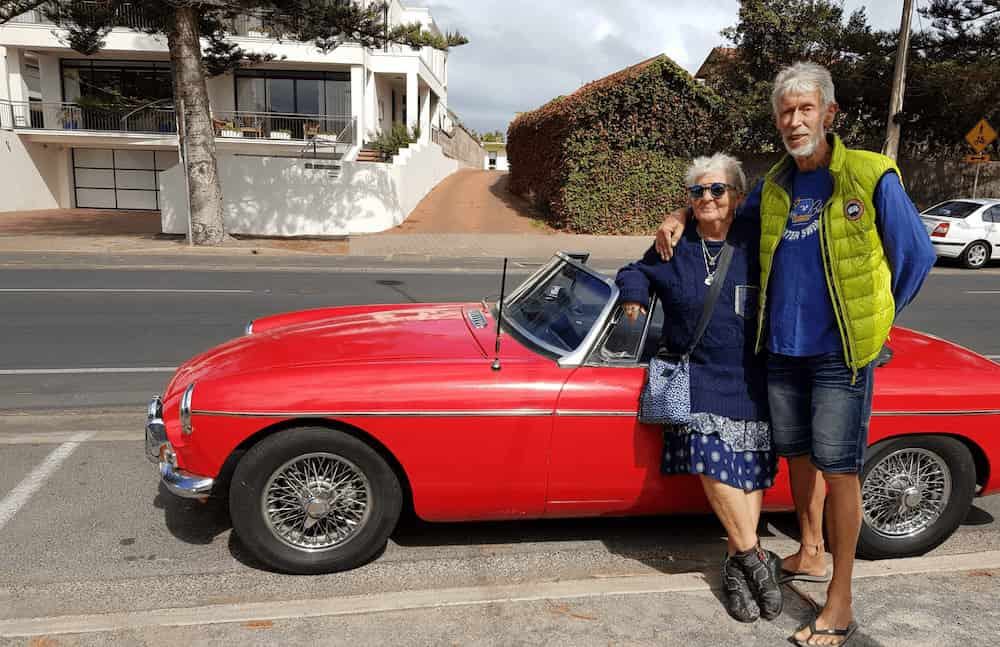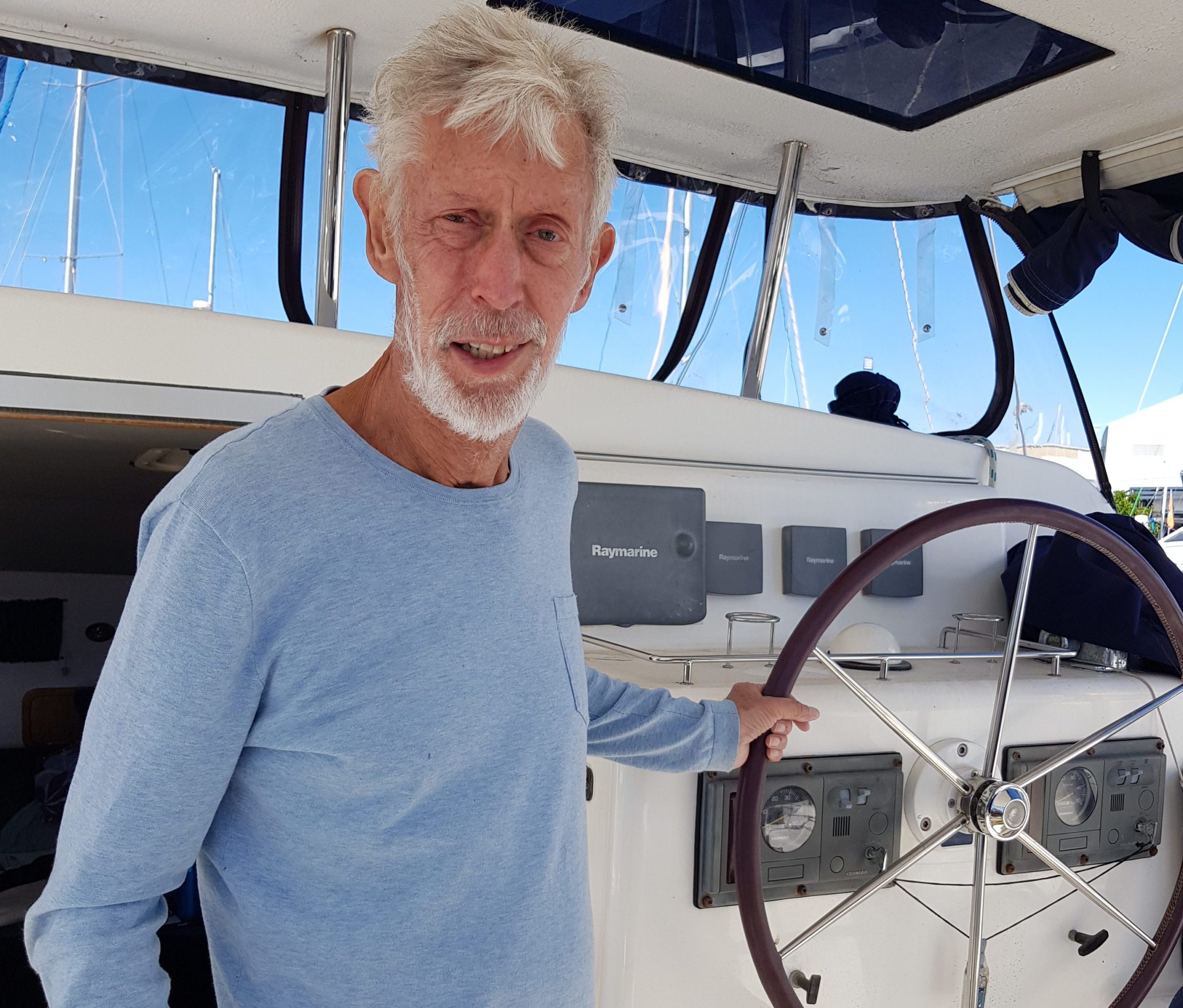Geoff feels blessed to be on a trial and never wastes a day

Geoff Cashman was training for the Whitehaven Beach Ocean Swim in the Whitsundays when he was diagnosed with mantle cell lymphoma (MCL) in November 2015, at the age of 70.
At first, he felt he had overdone things physically, having put in a few days of training in the Airlie Beach Lagoon.
“I was feeling very tired, almost exhausted,” said Geoff, 73, of Adelaide.
He and wife, Cathy, who have a boat and go sailing every year, were aboard their catamaran on the Great Barrier Reef, on their return voyage from Cairns in North Queensland.
Geoff went to see a GP who found a lump on his neck. After a blood test pointed to cancer, he flew to the Gold Coast for further tests, which confirmed he had stage IV MCL.
“When it sunk in that this cancer was terminal, that there were no cures, only drugs to prolong my life, I felt confused, shocked and numb at first,” he said.
“Then I felt angry and a bit depressed. It felt like a giant kick in the guts. I had always been very fit and generally healthy,” said Geoff, who had spent a lot of time sailing, swimming, bike riding and running, prior to his diagnosis.
“While Cathy was very shocked and upset, she was extremely supportive and asked all the important questions of the specialists, when I was still in a state of shock.”
R-CHOP chemotherapy
The Cashmans returned to Adelaide, Geoff saw a haematologist, and he was treated with 10 rounds of R-CHOP, in three-weekly cycles.
“Unfortunately, after finishing this treatment, the MCL got worse with the tumours growing larger,” said Geoff.
His haematologist referred him to Dr Constantine Tam who was heading an investigator-led clinical trial in Melbourne. The Phase III trial was for a combination of two targeted drugs – ibrutinib and venetoclax (also known as ABT-199) – which were expected to have a synergistic effect.
“I went to Melbourne for an interview and tests and was blessed to be subsequently accepted on to the four-year trial, in August 2018,” said Geoff.

Being on the trial involves taking the two oral drugs in tablet form daily, flying to Melbourne each month for blood tests and a check-up, and having a cat scan every three months.
“So far, so good,” said Geoff.
“The latest scan, in May 2019, indicates the situation has stabilised and I am now regarded as being in remission.
“People help me, but I believe you have to help yourself.
“It does help to have a very strong and supportive wife who is also particularly patient with my many shortcomings!
“Cathy is my major supporter, keeping me going with the treatment which at times is exhausting and debilitating,” said Geoff, referring to the side-effects of the trial drugs. His main issues are chronic fatigue, nausea and diarrhoea.
“The side-effects are a bummer, but no pain no gain.
“Without the drugs, I’ve been told by the doctors that my health would deteriorate rapidly.”
Cancer-related fatigue
Although Geoff was “reasonably thin” before his diagnosis, he has since lost some weight, mainly muscle.
“I have lost my appetite and struggle to keep weight on and as a result I am significantly weaker and have a lot less energy, with constant fatigue,” he explained.
“This has curtailed my physical activities significantly and I am not able to compete in sailing competitions, triathlons and swimming events as I did before the cancer.
“I now spend a significant amount of time reading books, watching sport and having long coffee sessions with friends.”
Cathy said Geoff was blessed with many friends – “old school chums, work mates, sailors, swimmers, cyclists and triathletes who would walk over hot coals for him”.
“Most people didn’t believe Geoff would get cancer, with his healthy lifestyle, diet and stress-free attitude,” said Cathy.
“Chemo hair loss helped people accept his diagnosis. And his current super skinny appearance has made people bring cakes to coffee, to fatten him up!”
Staying positive after cancer
Geoff said he has trouble concentrating and focusing, so no longer drives and recently he had to sell his beloved MG sports car.
“Emotionally, I feel I am a lot more tolerant towards people with health issues,” said Geoff. “Mentally, I sometimes lack clarity of thought and my memory can be terrible, but I don’t worry because there is no point.
“Spiritually, I find walking on the beach in the morning uplifting.
“I have done some meditation and find it very helpful to remain calm and have a positive attitude.
“I know I have only got a limited time and I feel it is important to just get on with my life, to be happy and enjoy each day, and not to sweat the small stuff,” said Geoff, who was looking forward to his pea and ham soup for tea.
He eats simple foods to minimise nausea, sees friends, fixes “stuff” on the boat, sits in the sun and takes up opportunities to help others less fortunate than him.
“I never waste a day but then I never have.
“Life is precious. Enjoy every day and don’t let cancer drugs, doctors, or anyone claim your soul and destroy your love of life.
“I am lucky enough to have been sailing up in north Queensland for the past 10 years. Although I am limited as a result of my cancer, in long voyages, I am still enjoying pottering around the Gold Coast and Moreton Bay,” said Geoff.
This is where the Cashmans were when they spoke to Lymphoma News. They are due back in Adelaide in late-November.
“This might be the last year. It’s getting hard to manage the boat,” said Geoff.
This story features as part of Blood Cancer Awareness Month 2019, helping to raise awareness of every blood cancer.
Last updated on January 3rd, 2023
Developed by the Leukaemia Foundation in consultation with people living with a blood cancer, Leukaemia Foundation support staff, haematology nursing staff and/or Australian clinical haematologists. This content is provided for information purposes only and we urge you to always seek advice from a registered health care professional for diagnosis, treatment and answers to your medical questions, including the suitability of a particular therapy, service, product or treatment in your circumstances. The Leukaemia Foundation shall not bear any liability for any person relying on the materials contained on this website.